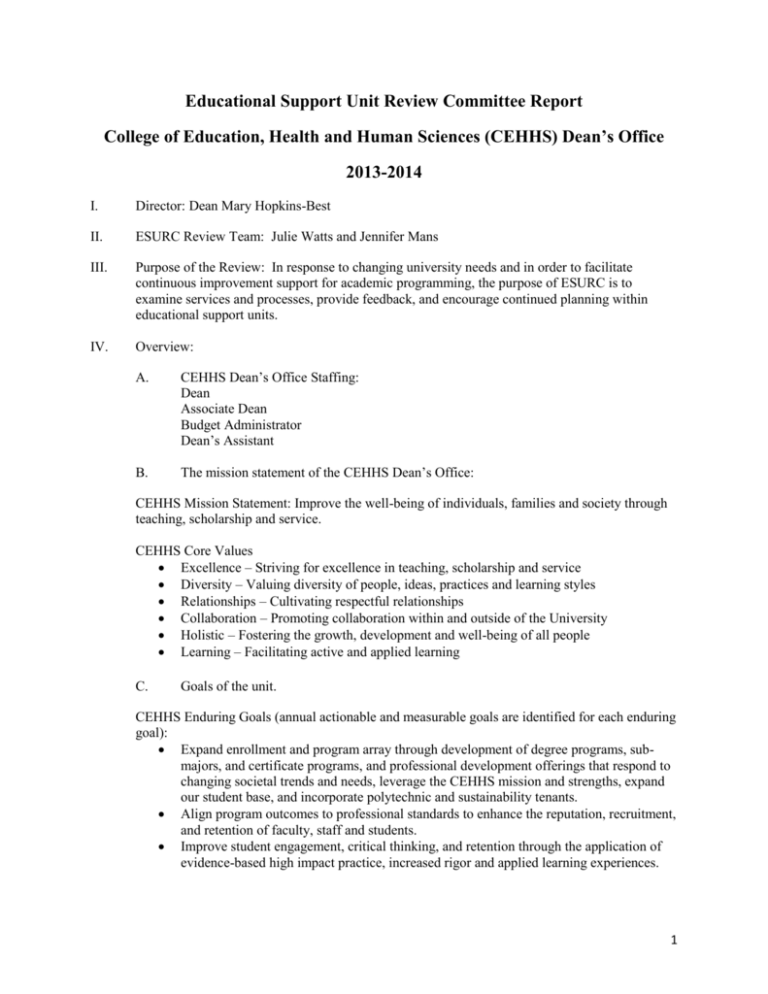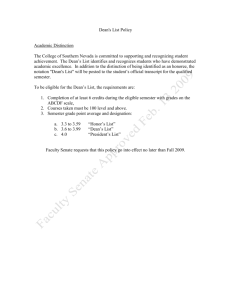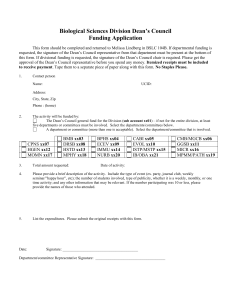Educational Support Unit Review Committee Report
advertisement

Educational Support Unit Review Committee Report College of Education, Health and Human Sciences (CEHHS) Dean’s Office 2013-2014 I. Director: Dean Mary Hopkins-Best II. ESURC Review Team: Julie Watts and Jennifer Mans III. Purpose of the Review: In response to changing university needs and in order to facilitate continuous improvement support for academic programming, the purpose of ESURC is to examine services and processes, provide feedback, and encourage continued planning within educational support units. IV. Overview: A. CEHHS Dean’s Office Staffing: Dean Associate Dean Budget Administrator Dean’s Assistant B. The mission statement of the CEHHS Dean’s Office: CEHHS Mission Statement: Improve the well-being of individuals, families and society through teaching, scholarship and service. CEHHS Core Values Excellence – Striving for excellence in teaching, scholarship and service Diversity – Valuing diversity of people, ideas, practices and learning styles Relationships – Cultivating respectful relationships Collaboration – Promoting collaboration within and outside of the University Holistic – Fostering the growth, development and well-being of all people Learning – Facilitating active and applied learning C. Goals of the unit. CEHHS Enduring Goals (annual actionable and measurable goals are identified for each enduring goal): Expand enrollment and program array through development of degree programs, submajors, and certificate programs, and professional development offerings that respond to changing societal trends and needs, leverage the CEHHS mission and strengths, expand our student base, and incorporate polytechnic and sustainability tenants. Align program outcomes to professional standards to enhance the reputation, recruitment, and retention of faculty, staff and students. Improve student engagement, critical thinking, and retention through the application of evidence-based high impact practice, increased rigor and applied learning experiences. 1 D. Facilitate inter- and intra-disciplinary collaboration among faculty, staff and students to foster entrepreneurship and innovation in teaching, research, scholarship and service and support capacity building and expansion of funded research. Model inclusive excellence through infusion of content related to ethics and diversity throughout the curriculum. Improve marketing initiatives to reach new audiences and diversify the student body. Improve student retention. Recruit, retain, and enhance the well-being of faculty, staff and students by maintaining an inclusive, collegial, trusting, supportive and professional climate; supporting professional development; and emphasizing the importance of balancing person and professional pursuits. Assure appropriate CEHHS office, laboratory and classroom facilities. Expand, support, and improve customized instruction offerings. Services provided by the unit. The Dean’s Office provides leadership, oversight and support for the college’s strategic plan, curriculum and program development, expansion of research and research capacity, assessment and accreditation. The Dean’s Office also provides fiscal management for the college and oversight of resources including personnel, equipment and facilities. The Dean’s Office supports the governance functions of the college, provides college level orientation and mentoring, and supports the upkeep of the college and unit web sites. Two members of the Dean’s Office are college data leads. Specifically, the Dean’s Office provides the following services: Communicates with the Provost’s Office regarding the processing of personnel decisions and actions, budget transactions, curriculum, and all other major operations. Provides college level, and coordinates unit level orientation and mentoring of new faculty and staff. Oversees and support research and research collaboration. Sponsors monthly research colloquium. Coordinates the CEHHS Maybelle Ranney Price Endowed Professorship. Coordinates activities and functions related to degree and sub-major programs. Oversees and approves hiring and retention of CEHHS personnel. Monitors and tracks student credit hour production and student enrollment. Monitors and tracks faculty and staff workload. Development and continuous revisions to the Chair Handbook. Coordinates budget development and planning for the units housed in CEHHS. Provides all units with ongoing fiscal management support. Monitors and reviews all grant and contract activities within the college. Oversees and coordinates new program and curriculum development in conjunction with unit and university governing bodies that oversee curriculum. Provides leadership in the development of the CEHHS Strategic Planning process. Houses the Heritage Hall building supervisor. Oversees CEHHS facility and equipment needs. Notifies building occupants of emergency weather. Oversees the CEHHS role in the university COOP Plan. Facilitates resolution of student complaints related to instruction and academic issues. 2 V. Facilitates independent study applications. Authorizes program substitutions and waivers; coordinates GE substitutions and waivers with the Provost’s Office. Coordinates functions and activities of the CEHHS Dean’s Student Advisory Council. Coordinates the annual CEHHS Celebration of Teaching and Learning. Schedules and coordinates all college meetings. Schedules and coordinates the CEHHS Chair/Director Council and the CEHHS Full Council (which additionally includes all Program Directors). Reviews and approves travel requests. Reviews and approves time management. Coordinates the issuing of keys and card access for the college. Host a CEHHS Classified Staff retreat each summer. Process Followed for the Current Review: Information requested by ESURC was provided through the written self-study, a presentation given by the CEHHS Dean’s Office, and surveys sent by the ESURC Review Team. An ESURC internal survey was sent to the CEHHS Dean’s Office staff, one respondent completed the survey (out of 4) therefore the internal survey results were not considered in this report. An ESURC external survey was sent to the university community and external stakeholders, 76 respondents completed the survey (out of 171) for a response rate of 44%. The returned surveys were summarized by the Planning, Assessment, Research and Quality office and examined by the ESURC Review Team. The review team, as part of the review examined these surveys, the self-study, the website and additional information provided by the unit director. The full ESURC Committee had a discussion regarding the report, presentation, and surveys, and this is taken into consideration during the review. VI. Previous Review: The last Educational Support Unit Review of the unit most closely resembling CEHHS was completed in 2005-2006 review cycle for the College of Human Development. The following are examples of progress towards the recommendations from the last review. 1. Review the process of allocating teaching and non-teaching resources to ensure equity. At the time of the 2005-2006 ESUR study, a service unit within the, then CHD, college sought to participate in the Laboratory Modification process and was ultimately denied. This raised considerable angst related to the allocation of resources to credit and non-credit generating units because the service oriented non-credit generating units provide essential support to the teaching mission through the provision of experiential, research, and service opportunities to students. Whenever possible the College of Education, Health and Human Sciences is equally transparent and supportive of all units. Examples include but are not limited to including faculty and academic staff with research responsibilities in the college sponsored competitive research support initiatives, and supporting professional development for the credit hour and non-credit hour producing units. There were no concerns noted in the survey narrative responses related to teaching and non-teaching equity issues. 2. Review strategy of delegating budgetary responsibility to departments/units towards ensuring input into resource allocation. CEHHS continually works closely with departments on all categories of their budgets. The college has worked to place funds into the departments to allow them to make hiring and 3 purchasing needs. The college meets annually with departments prior to the following year’s budget submission to provide the opportunity to request additional or changes to current budget allocations. The college also provides opportunities throughout the year to request additional resources. CEHHS provides any budget changes to the Chairs Council and requests feedback and suggestions as any budget changes may arise. Eighty-four percent of the survey respondents agreed or strongly agreed to the item: “Within the resources of the College, this unit provides opportunity for input into the allocation of fiscal resources.” 3. Increase visibility of policies, process and procedures. Chairs and Department Associates are informed whenever the Dean’s Office becomes aware of new or revised university procedures/polices and provides the link or the updated document. These are also frequently discussed at CEHHS Council meetings and guests are invited to discuss the policies and procedures with the CEHHS Chairs, Directors, and Program Directors. New CEHHS procedures or initiatives are discussed at All College meetings and at Council meetings. Seventy-eight percent of the survey respondents agreed or strongly agreed to the item: “Policies and procedures are well known, understood, and consistent.” However, it is the intent of the Dean’s Office to follow-up on this item to determine for those who did not agree with this item: “What policies and procedures are not well understood, whether those are the college or university level, and/or if their concern is with consistency of policies/procedures.” The Dean and Associate Dean meet with each unit at least once each semester to update all of faculty and staff on new initiatives, changes in policies, etc. Additionally every effort is made for the Dean, Associate Dean and/or Director of the School of Education to attend all Program Advisory Committee meetings. Each summer the Dean’s Office hosts a retreat for all CEHHS Classified Staff to discuss new policies or procedures and obtain input from those very valuable members of our college on our procedures and initiatives. 4. Continue to proactively pursue facilities improvement. CEHHS has pursued facility improvement through several means including lab modification, funding from the Dean’s Office and State Small projects. Improvements have included the following: - Heritage 371 was renovated from a storage unit into a classroom/research laboratory. - Vocational Rehabilitation room 302 was refurnished including a media station and sound system. - Vocational Rehabilitation 220 and its various counseling labs were provided a technology upgrade and another upgrade is currently being provided. - Heritage 132 is currently being renovated into a teaching/research lab for the Food Science component of the Food Science and Technology program. - Heritage 240 was reassigned and renovated into offices to accommodate the closure of McCalmont Hall. - Heritage Hall 115 and 119 were renovated to provide five offices to accommodate the closure of McCalmont Hall. - The Communications Technology building room 225 was renovated into five offices to accommodate the closure of McCalmont Hall. - The Psychology Department was moved into Harvey Hall and rooms were renovated to accommodate the Psychophysiology labs, Psycho-sensory labs and Psychology Tutor Center. 4 - VII. Laboratory Modification assisted with renovation of Heritage 251/252 for the Food Sensory lab including computers and carpeting. The Human Performance Lab, Heritage 423/427, was provided a lab mod to update equipment and purchase materials. The Dean’s office provided funding to calibrate equipment in Heritage 427 in the Human Performance lab as well as calibrate equipment in Heritage 371 as a Foods lab for teaching and research. The Child and Family Study Center was provided a lab mod and funding through the Dean’s office to upgrade playground equipment and safety equipment and fencing. Heritage 103 was provided a lab mod for an interactive whiteboard to enhance teacher preparation and to maintain accreditation. Heritage 105 was also outfitted with an interactive whiteboard for teacher preparation. Room 310 in the Vocational Rehabilitation building was renovated to accommodate media upgrades for teaching. Unit Review: A. Unit Strengths University Best Practices - Several documents and processes developed by the CEHHS Dean’s Office not only are used within the college but also are utilized by the larger university community. For example, the CEHHS Dean’s Office created a department chair handbook, which has been adopted by the university to be used across campus for department chair training. The CEHHS Dean’s Office also is a leader in promoting and guiding research in that research-related initiatives that speak to the college’s strategic plan are supported through various revenue streams. (ESURC Discussion and Presentation) Strategic planning - The CEHHS Dean’s Office helps to generate, implement, and evaluate the college’s strategic plan and planning process. Faculty and staff perceive that they are able to provide adequate feedback relating to the CEHHS strategic plan. The current college strategic plan ties to the goals of the university, exhibits SMART (specific, measurable, attainable, relevant, and time-bound) characteristics and includes regular evaluation and targets for each goal. (Self-Study, External Survey, and Presentation) Accessibility and responsiveness - The CEHHS Dean’s Office is accessible and responsive, especially in situations that need prompt decisions and/or a quick turnaround time: “very responsive…;” “…willing to meet and listen to concerns;” “friendly and helpful front office;” “follows up…;” “always available and there to help;” “timely responding…;” and “maintaining an open door.” (External Survey) Efficient and competent - CEHHS office staff members are knowledgeable about processes and procedures, experienced in management, well organized and professional. The staff also has done a good job of providing efficient and effective services. (External Survey, ESUR Committee) Innovative and responsive leadership - The CEHHS Dean’s Office has a visionary leader and models innovation and responsiveness to the rest of the college. The Dean’s Office seeks to understand the needs of the college and is open to new initiatives and ideas. The Dean’s Office tends to make decisions after thoughtfully considering all possible perspectives and consequences. 5 B. Opportunities for Improvement Availability and responsiveness - The majority of those surveyed indicated that the CEHHS Dean’s Office was, overall, accessible and responsive. Nonetheless, the CEHHS unit identified points within this area for improvement. For instance, the external survey revealed a need for greater visibility by the Dean’s Office to those individuals in departments and units, especially those located in buildings other than Heritage Hall. To address this, the Dean and Associate Dean plan to schedule an open office hour each week and to schedule regular walkarounds to the five buildings in which CEHHS units are housed. In addition, the external survey indicated that at times budget issues and questions seemed to deserve more rapid responses. To address this, the CEHHS budget manager plans to schedule quarterly standing meetings with each unit’s budget officer. Minutes from budget and Council meetings will be sent to those individuals, and they will be invited to attend Council meetings when budget changes and issues are discussed. The CEHHS Dean’s Office will implement a practice of responding to inquiries within 48 hours or notifying the individual if a longer response time is needed. The committee recommends that the CEHHS Dean’s Office implement this model and evaluate its effectiveness annually. (Self-Study, Presentation, External Survey Results) Communication of policies and procedures - The study revealed that the communication of policies and procedures also could be improved. However, the survey responses did not indicate whether these referred to those at the college or university level. Given this, the CEHHS Dean’s Office plans to seek out additional information. Specifically, the Dean’s Office plans to charge the CEHHS Governance Council and CEHHS Council members with seeking more specific information so improvement measures can be planned and implemented in a timely manner. The ESUR Committee supports this suggestion. (Self-Study, Presentation, External Survey Results) 6








